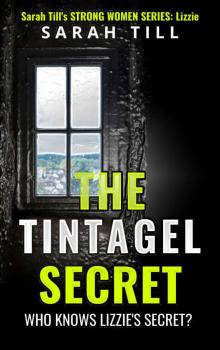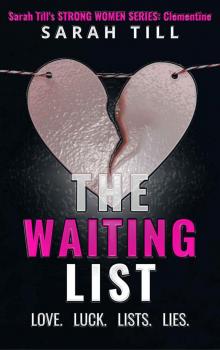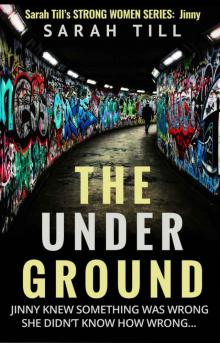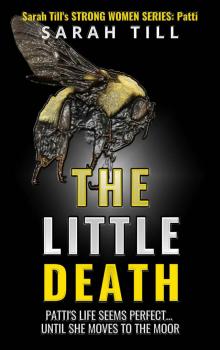- Home
- Sarah Till
The Tintagel Secret Page 6
The Tintagel Secret Read online
Page 6
'You have got somewhere to sleep, haven't you, love? Here's some money for a cup of tea, go and get yourself warm.'
I called after her.
'You don't understand. It's not like that, how you think.'
But it was how she thought, and still is. Me and Macy.
I've still got my original vehicle. I was a little bit nervous about keeping it at first, but I've walked past the supermarket every day and they've never asked for it back. I always have lots of bags in it, that's my strategy for making whoever is looking out think I've just bought something. I've fitted some bicycle mirrors to the sides and given her a name. Macy, after Macy's store in New York, somewhere I read about in magazines.
I've also tied some ribbons to it to make it look pretty, but they soon get grubby in the sea air so I resorted to foil streamers. In the summer I always have meadow flowers woven in and out of the metal and in winter, ivy and holly from the bushes in the lane. You'd never know she was a shopping trolley, and to me, she isn't. She's and extension of me, where I carry everything that's precious to me, because you I never know if I will make it back to the shed each day.
Even Tintagel has been a bit of a let-down. People have always said that you can holiday as much as you like in one place, but it's never the same as living there. As soon as I had begun to push Macy around I began to notice the shabby remnants of hastily built King Arthur memorabilia scattered around the town. Renamed car parks, café's and even the Camelot Hotel. As a child it seemed exciting and wonderful. But now it was like a half-baked attempt at a theme park. It's the same now as I walk up the High Street, A woman drags a chained-up knight of the round table and a statue of a wizard back into her shop as she closed for the day. There was even a museum for, as I remembered from my father, a legend or myth that now every two-bit entrepreneur was eager to make a quick buck out of.
I feel terrible thinking about myself at a time like this, with two women in the mortuary, but I have to work out what this object is and why someone wants it so badly. I think for a minute I've misjudged the situation, and it isn't the golden metal that they want, it's something else.
But first, my mission is to take down all the posters on the main street. Preferably without Julia Scholes seeing me. As well as the 'Wanted' posters, and the laminated posters about the meeting Julia has made some laminated A3 posters telling us all about the vagrancy act of 1824.
I push Macy down to the Pharmacy and pluck a few laminated posters from the lamp posts. I laugh as I think they will come in quite handy for insulating the roof of the shed. I'm just starting on the batch of posters that are stuck on the car park hoardings when I spot Julia in Macy's rear-view mirror. She's rushing towards and, followed by Sue-Ann Brown, the secretary of the Community Committee.
'Stop that, Lizzie. Put those down.'
She grabs the posters and starts to put them up again. I wait until she's onto the third one in the montage, then take down the first and second. And so on. I can see Sue-Ann smiling out of the corner of my eye.
Eventually, Julia loses patience. She turns and faces me
'So just how have you let yourself get into this state? Living in a field? You don't have any pride at all, do you, Lizzie? I’m not persecuting you, Lizzie, I just want to understand what is wrong with you. And I know these murders have something to do with you. I can feel it in my water.'
I look at her and something’s not right. She has dark circles under her eyes and her face looks quite thin. She pokes me in the chest, but I stand my ground. Sue-Ann grabs her arm as she squares up to me.
'Come on, Julia. She's not worth it.'
'No. No, let's see what she's got. She's big enough to pull down my posters, let’s see if she can face me. Eh, Lizzie? You stand there, in your clothes you haven't washed for weeks, if you ever have bloody washed them, and your brown teeth, reeking of bloody dirt, and look at those shoes.'
We both glance down at my red sequined pumps, with the soles hanging off. Sue-Ann rushes off to get help and I draw closer to Julia.
'No place like home. No place like home.'
She stares at me and pushes me. I grab at her arm and pull her close up, so close that my lips are next to her ear. 'Sorry, Julia, wrong fairy-tale. Would it be better if I dressed up as a witch or maybe Morgana? Be more in keeping, would it? I know you think I'm crazy, and I know you want me out. But I'm not going anywhere. OK? You see, I've got nothing to lose.' She backs away and I hold onto Macy, waiting for the slap or poke or, if I'm less lucky, right hook. She's red faced and pointing at me by the time Alice arrives in the nick of time.
'She's not what she seems, that one. She just spoke to me.'
Alice stands between us. Lovely Alice. It strikes me it’s a wonder she’s not married by now, a pretty little thing like her. But she’s living all alone above her shop, never leaves the village. I don’t really see her out and about much, yet she always appears on the high Street when there is any danger. She’s somehow soothing, and she’s calmed Julia down a little.
'What do you mean, Julia?'
'Well. She acts all cookie and mad and comes out will all those funny things and well, you only have to look at her to see she's mental. But she just spoke to me, clear as daylight. It's all a fucking act.'
Alice turns to me now and I look at my shoes.
'No place like home. That’s all I said. No place like home.'
I click my heels together and Julia explodes.
'I heard her. She just threatened me. She said she'd got nothing to lose and she'll come after me.'
I shake my head and push Macy round to the beach. As I walk past the museum, I automatically catch a glimpse of myself in the glass doors and remember who I am now, and who I used to be. But this time I look past myself and into the hallway, past the wooden frames and my gaze rests on the etching of a golden cup on the oak doors. Something inside me wakes and I know that I need to find Andrew and ask him what he knows about Mum's treasure and why people want it so much. Maybe then, if I do decide to tell Mia, and ask her for help, it will sound a bit more credible.
CHAPTER 7
My route, today and every day, takes me past the bakery, where I can often find a discarded muffin or croissant in the bin. People don't know they are born, throwing away good food like that. I've got used to the sand now, I think it's worn the enamel off my teeth and helped them to darken a few shades. I walk down past the castle and to the sea. Depending on the tide, I either stand at the rail and look at the water rhythmically washing against the stones or drag Macy down the steps and onto the beach. It's hard work to get her back up again, but, like I said to Julia, what have I got to lose? If I slip and fall, it's not as if I have work the next day to worry about.
The tide is in today so I sit on the top step and read the poster again. It says at the bottom that I will be discussed at the committee meeting. There is a list of my alleged crimes against the community and I laugh as I read them aloud. Vagrancy. Living outside on the beach/fields/street. Begging. Theft. Aggressive behaviour. Making the village look untidy. Hastily added murder. Hardly a balanced list but all the same, thorough. I consider drawing up my own list and posting it, something about Julia and the way she's bullied me for years. I look around. No sign of the police, nothing to point to a double killer. Ever since Susan Blake's body was found I've been scared to death. Looking over my shoulder more than normal, wondering if whoever's threatening me is behind me, waiting to kill me. That's the way it gets you.
What with Mia knowing about one of the notes, it's only a matter of time until I have to tell her about the stack of paper I've been keeping in the shed, all with the same message. Kill You Next Time. Of course, when it first started last year I had no idea how bad it would get. I seriously thought I was imagining things, but the worse it got the more insecure I felt. I know it's serious now, someone is after me and I should really think about finding Andrew, but I think about the meeting. If Julia succeeds and gets the Council to agree to an injunction, I'
ll have no source of food or money. Her bullying would have succeeded and I'd have to leave Tintagel.
Julia first started to hate me around four months after I moved here. I'd been sitting on the beach, stockings and shoes off, enjoying the sea breeze. It took me a while to learn the tides. But that particular day I had a moment where it all came together, where I realised how the sun and the moon and the tides all worked. I'd read Stephen Hawking's Brief History of Time; I remember going outside and thinking how exposed we all are, walking around on the surface of a planet, with nothing but space above us. Now, deep in thought about gravity and the pull of the moon, and E=MC2, I suddenly understood how perfectly balanced the universe must be for all the heavenly bodies to spin around each other, for so long. Also, that one small movement could destroy that equilibrium.
Until this moment, I'd been fairly happy and settled, it had been warm and sunny most days, and even the dull days had a fluffy edge to them, as the clouds rolled in from the sea. The castle loomed above me and the caves below, all of my childhood memories rolled into one spot, linking me to my past without ever having to think about it. The sunflowers in my yard had grown shoulder high, and their heads were beginning to ball and nestle between the lush leaves. I knew my goal, to have this sorted out before they raised their heads to the sun, and I knew I still had no idea how I was going to do it.
I'd heard nothing from Andrew and had very little money. I'd tried to cancel my direct debits, but again, customer services won through. I'd been living out of the skip behind the supermarket, and from the bakery in the mornings, scraps people left and tossed into the bin. In the afternoon, I'd wait in the strawberry gardens for people to leave their six pounds twenty-five cream tea half finished. Then go to guzzle the pot dry before the waitress came back. I'd scoff the scones and run back to Macy with whatever was left on the plates. I hadn't starved.
I'd closed my eyes for a second, my head resting against the break wall, when I heard a shrill voice.
'Come on. You can't sleep here. This is for tourists.' Julia had manhandled me up the steps, but I ran back down for my trolley. 'Look. If you don't get out of here right now, I'm going to make a citizen’s arrest. You're a dirty old hag. Mentally ill. People like you should be locked up. Danger to the community. I'm a judo expert, you know.'
As always, a crowd had gathered. I'd learnt long ago that the best thing to do when cornered is to freeze. Most animals will do it as a first line of defence, and I had done it in the past, frozen and blanked out the words and actions. Eventually she backed off and started to walk away
'You were lucky that time. But I'll get you.'
It had preyed on my mind in the months afterwards, and I began to wonder if Julia had nothing else to do. I knew she was married to Bradley Scholes, a local businessman, although to say he ran a haulage business he spent an awful lot of time in Julia’s shop. There was one incident where she had a run-in with a local teenager. She has screamed up and down the High Street that Julia was a control freak, that she had reported the family to social services. I suppose that was part of Julia’s problem, she wanted control and, faced with defeat, would go to any lengths to get it. So, at first, I thought the notes were just another way to hurt me, just part of the horribleness of Julia.
Most of my days were pretty routine. Through town, past the bakery, up the street with the morning shoppers, onto the beach, up to the castle. Onto the headland, of course – a couple of hours there rain or shine, because that's where my heart was. Then, at fiveish, down to the supermarket. After that, depending on the season, I would either go home or go down to the beach. Tintagel draws a certain type of person, and it was that summer that I began to first recognise that I wasn't alone. Like Eleanor Rigby, I'd live in my own existence, milling around, with thousands of other lonely people, all side by side. What stopped us connecting, getting to know each other? Even smiling as we passed, a silent acknowledgement that, actually, you were never alone?
I supposed I'd been alone when I was married to Stan, in a way. Although all three of us lived in the same house, we had separate existences that hardly ever merged. The only time we held it together as some kind of misshapen family was when someone was watching. Christmas, birthdays, even at Stan's funeral, it was helps in the family shape. Loneliness means that there is no shape to be held, and existence goes fluid. There were lots of very fluid people on the Tintagel beaches of an evening. Groups of tourists would gather and sit around fires, barbequing and strumming guitars, mostly young people with bottles of beer and bleached blonde hair. On the perimeter there would be a single soul sitting quietly in the background. Maybe another one around the other side, set back from the group, just listening. Someone else again, warming their soul on the vibes of other people, just close enough to feel humanity. Oh, I'd spent enough time on my own by now to think about it.
I'd sit with my back against the breakwater, Macy shielding me from view, but I'd listen to the stories of the castle sometimes, but mostly of the caves and the headland. It wasn't the Disneyfied Sword in the Stone stories. Or the sterilised Hollywood movie versions of Arthur that attracted them here. It was the gaping caves underneath the castle, and the tales of witchcraft that accompanied them. Passages from Faye Sampson's books would be read aloud, with only the background noise of the crashing waves echoing into the caves. Morgana, Morgana, Morgana. Their favoured myth was Arthur's half sibling, the shape shifting waif who haunted my father and became the bane of my life. I could almost picture my father sitting here, telling them how I was like Morgana, the black sheep, the dark horse, the odd one out, just like here. She was Arthur's sister, his alter-ego, without power yet influential. According to the stories, she was a witch, using magic to get her own way. Beguiling her own brother and carrying his child. Magic. I sometimes wonder if this place still holds the old magic from Morgana's time, if she's still here somewhere, but it's safer to edge you bets and look after yourself anyway. That's what she would have done.
Eventually the fires would peter out and the groups would collectively wander back to their guesthouses. There would still be dots left in the darkness, loners sitting on the beach, free to leave whenever they pleased. It was in this half-darkness, with only the moon to light the sand, that I first saw Jerusalem. Despite my dull marriage, I'd never lusted after anyone, never fancied any of the men I'd seen around Manchester or here. Lately I'd resigned myself to the fact that no one would want me like this and accepted it. When I first saw him, he looked older than I later found out he was. His back was to me and he leaned against his motor bike. He had a huge tattoo covering his shoulders, a pair of angel's wings, and his head was shaved with little strands of grey breaking though, that shone silver in the moon light. His arms and legs were crossed and he looked at peace with himself. I watched him for an hour or so, along with all the other people dotted around the beach. They began to leave one by one and soon Jerusalem got up and pushed his bike up the beach. I watched him until he was out of sight.
Like most days, I'd end my designated route with a walk along the beach. Then up the lane home, to count any money that had been thrown at Macy, or anything I had managed to salvage along the way. Over the first months I'd collected enough money to buy a paraffin lamp and paraffin heater for the shed. I hadn't been inside the house, except to look for mail. The only time that I broke my routine was when I went into Padstow to sign on. I'd get the bus in the morning, as my appointment was always at ten on a Wednesday. Then I'd walk along to Andrew's office and sit on a bench outside. I missed him so much and the only way I could survive was to see he was all right. My dreams were of him in a terrible accident and asking for me, or not eating or having no roof over his head, all the things I had provided for him. I needed to know that he was still alive.
Most Wednesday's he'd take his lunch at twelve thirty, walking down to the local Pizza Express. He was eating. Sometimes he would leave with a someone from the office, they would laugh and talk. He was happy. He had friends. After t
hree months, he would meet a girl on the corner of the High Street and walk through the park with her. After three weeks they held hands. After six weeks they kissed. By the end of summer, she wore a wedding ring. I'd missed my son's wedding. It was devastating, even after all he had done to me. Not only was I not allowed to see him or speak to him, but he'd deprived me of something precious to a mother, my expectations. I tried to remember that he was happy, and that you are only ever as happy as your saddest child, but it twisted my mind past the point I could reasonably tolerate. I know it was cold that day, and winter was drawing in because when I got back to the shed I was shivering, and I stayed under the covers for most of the next three days.
In fact, for most of the winter. I would have a walk around town once a week, around the designated route and up to the headland. Tintagel was different in winter. The sea was rough and noisy and the air was crisp instead of damp. The soft ground hardened and when I put my hand on the tufty brush of the headland, I could feel no life. Like me, the earth was hibernating, staying put until spring pushed through. My first year in Tintagel ended with me unlocking the door to the house to find it green with algae, tentacles of mould climbing all the walls. The water appeared to have stopped, but I wasn't naive enough to think the leaks had repaired themselves. I hadn't collected any post since November, and now it was the beginning of March, or so the postmark on the top letter said. I had no way of knowing; I had no radio, no clock, no watch. Nothing to indicate the time.
None of the letters said anything of consequence. There was nothing from Andrew or anyone else who could help me. I ripped them up and put them with some newspapers that I would burn when I ran out of paraffin. Outside, I suddenly worried that hadn't planted the seeds like last year. I rushed indoors and pulled out the crumpled foil packets I had saved. I'd grown carrots and beans and cabbage. Lettuce and tomatoes came a little later. I stamped the seeds into the ground, and finally, I looked at the sunflowers. I'd intentionally ignored them at the end of summer, their heads stretched towards the clouds; they were my signal for success and failure, and it seemed, I had failed. Their rotten heads drooped now, empty and brown after the frost. I tugged at the first one, taking the head on its own and leaving the woody stalk. They all came away quite easily, and I tossed them in the compost. The stalks were harder, I had to pull and pull as their roots had grown deep. I hurried back to the shed for a trowel and bent to dig around the base of the stalks when I saw a miracle. Tiny sunflower seeds had fallen and were searching for roots, a green shoot of a head reaching up from the other end. I sat on the floor and breathed in the warm air. I'd survived a full year on hardly anything, and I'd been given another chance. The seeds had come back and I still had a chance at success.

 The Tintagel Secret
The Tintagel Secret The Waiting List (Strong Women Book 5)
The Waiting List (Strong Women Book 5) The Under Ground (Strong Women Book 4)
The Under Ground (Strong Women Book 4) The Little Death
The Little Death